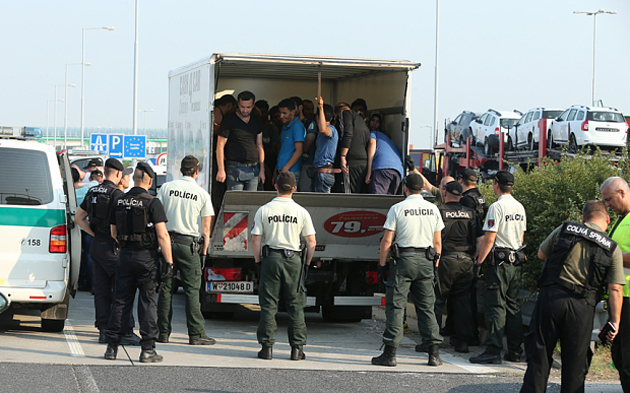Slovakia refuses to accept Muslim refugees
“We don't have any mosques in Slovakia so how can Muslims be integrated if they are not going to like it here?” Interior ministry spokesman Ivan Metik said.
BBC, Deutsche Welle · Bratislava · 20 AUGUST 2015 · 16:14 CET

Slovakia has said it will only accept Christian refugees under an EU relocation scheme. The country, due to receive 200 people under the EU plan to resettle 40,000 new arrivals, says Muslims would not feel at home there.
The Slovakian government, which will accept 200 people from camps in Turkey, Italy and Greece under the EU plan, denied that its decision to exclusively accept Christian refugees was discriminatory as it was intended to ensure community cohesion.
Slovakia's Interior Ministry spokesman Ivan Metik told the BBC: “We could take 800 Muslims but we don't have any mosques in Slovakia so how can Muslims be integrated if they are not going to like it here?”
“We want to really help Europe with this migration wave but...we are only a transit country and the people don't want to stay in Slovakia.”
REACTIONS: DECISION SHOWS ‘EGOTISM’
EU Commission spokeswoman Annika Breithard said she could not comment directly on Slovakia's decision, but emphasised that EU states were not allowed to discriminate.
Council of Europe General Secretary Thorbjorn Jagland also critcised the "blatant discrimination" of Slovakia.
The decision of the Slovakian governmente received sharp criticism from Germany. Norbert Röttgen, chairman of the German Bundestag's foreign affairs committee, told radio station Deutschlandfunk that Slovakia’s behavior is contributing to the failure of Europe, and that the country’s egotism would torpedo the EU's ability to act.
UN: DO NOT BASE SELECTION ON DISCRIMINATION
The UN's refugee agency (UNHCR) said countries should not discriminate when accepting refugees.
Babar Baloch, Central Europe spokesman for the UNHCR, said: “Resettlement is greatly needed for many refugees who are at extreme risk among the world's most vulnerable groups.”
“We encourage governments to take an inclusive approach while considering refugees for resettlement and should not base their selection on discrimination.”
EUROPEAN PLAN TO RESETTLE AS MANY REFUGEES AS POSSIBLE
EU member states agreed last month to take in 32,000 asylum seekers arriving in Italy and Greece over the next two years, less than the 40,000 target.
An attempt to impose a quota system to allocate refugees to EU countries failed after some nations such as Slovakia refused to accept the plan, so the scheme was made voluntary.
SITUATION MUCH WORSER THAN AFTER BOSNIAN CRISIS
The number of migrants at the EU's borders has surged in recent months, reaching a record high of 107,500 in July. Most are Syrians, Afghans, and sub-Saharan Africans, fleeing instability or poverty.
More than 240,000 migrants have crossed the Mediterranean already this year, arriving on the shores of Greece and Italy before travelling on to other destinations.
Germany, the biggest recipient of asylum-seekers in the EU, has said it could receive as many as 800,000 applicants this year.
The numbers are far higher than the record 438,000 asylum applications in 1992 during the Bosnian crisis.
Both the EU and the UN have called on other countries to share the burden.But EU leaders face a public backlash amid tensions over immigration.
PHOTOS "A LONG JOURNEY TO EUROPE":
Published in: Evangelical Focus - europe - Slovakia refuses to accept Muslim refugees
